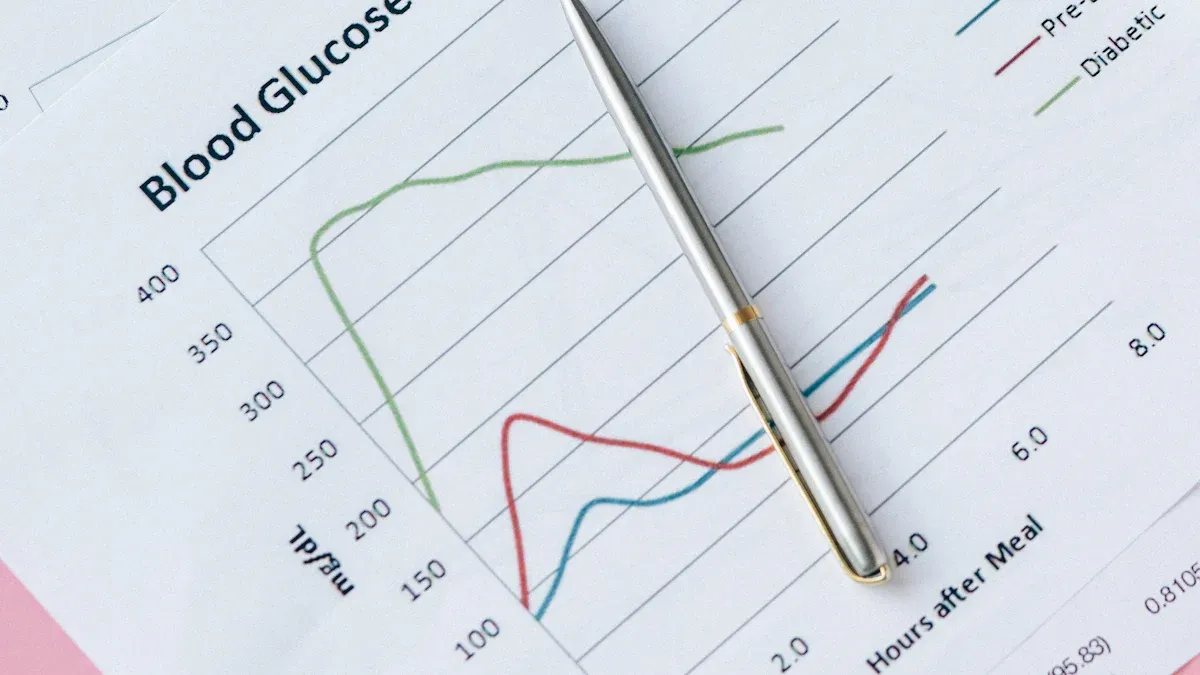The Impact of Sugar and Processed Foods on Cancer Risk

You may not realize it, but the foods you eat can significantly influence your cancer risk, particularly regarding the impact of sugar and processed foods on cancer risk. High sugar consumption plays a critical role in this connection. Cancer cells thrive on glucose, using it as their primary energy source. Research shows that diets high in sugar and carbohydrates can worsen outcomes for cancer patients. For example:
Women consuming over 35 grams of sugar weekly, along with pastries and cookies more than three times a week, face a higher risk of endometrial cancer.
Patients with stage-3 colon cancer who consume two or more sugary drinks daily experience increased recurrence and mortality rates.
Processed foods, often loaded with hidden sugars, further compound the problem. They contribute to obesity, a known cancer risk factor, and promote chronic inflammation, which can accelerate tumor growth. Understanding the impact of sugar and processed foods on cancer risk empowers you to make healthier dietary choices.
Key Takeaways
Eating too much sugar may raise cancer risk. Eating less sugar can help lower this risk.
Processed foods often have hidden sugars. Check food labels to find and avoid these sugars.
Being overweight is connected to higher cancer risk. Eating whole foods instead of processed ones can help you stay healthy.
Too much sugar can cause inflammation, which may lead to cancer. Cutting back on sugar can lower inflammation and improve health.
Small changes, like eating fruit instead of sugary snacks, can make a big difference over time.
The Science Behind Sugar and Cancer

How Sugar Fuels Cancer Cells
Glucose as a primary energy source for cancer cells
Cancer cells depend on glucose for survival. Unlike normal cells, which can use fats or proteins for energy, cancer cells rely almost exclusively on glucose. This dependency makes high sugar intake a potential risk factor. When you consume sugary foods, your blood glucose levels spike, providing cancer cells with the fuel they need to grow and multiply. This process highlights why reducing sugar intake is crucial in managing cancer risk.
Why cancer cells metabolize sugar more rapidly than normal cells
Cancer cells metabolize sugar at a much faster rate than healthy cells. This phenomenon, known as the Warburg effect, allows tumors to grow even in low-oxygen environments. By consuming large amounts of glucose, cancer cells generate energy quickly, enabling rapid proliferation. This unique metabolic behavior underscores the connection between sugar consumption and cancer progression.
Insulin and Insulin-Like Growth Factors
The role of insulin resistance in cancer development
Insulin resistance, often caused by excessive sugar intake, plays a significant role in cancer development. When your body becomes resistant to insulin, it produces more of this hormone to regulate blood sugar levels. Elevated insulin levels can promote cell growth, including the growth of cancer cells. Studies have shown that high glycemic diets, which cause insulin spikes, are linked to increased risks of colorectal, endometrial, and breast cancers.
Study Focus | Findings | Cancer Types | References |
|---|---|---|---|
Glycemic Index and Load | Higher dietary GI and GL linked to increased cancer risk | Colorectal, endometrial, breast, pancreatic | (12, 13, 14, 15) |
Hyperglycemia Effects | Increases DNA mutations, tumor survival, proliferation, invasion | Breast, prostate, colon | (16, 17, 18) |
Insulin and IGF-1 Role | Promotes tumor growth and metastasis | Prostate, colon, lung, pancreas, breast | (19, 20, 21) |
How elevated insulin-like growth factors promote tumor growth
Insulin-like growth factors (IGFs) are proteins that regulate cell growth and survival. High levels of IGFs, often associated with insulin resistance, can stimulate tumor growth. These proteins activate pathways that encourage cancer cells to divide and spread. By managing your sugar intake, you can help reduce insulin resistance and lower IGF levels, potentially decreasing cancer risk.
Chronic Inflammation and Cancer
Sugar's role in triggering chronic inflammation
Excessive sugar consumption contributes to chronic inflammation, a condition linked to cancer progression. When you eat sugary foods, your body produces inflammatory markers as part of its response. Over time, this persistent inflammation damages tissues and creates an environment where cancer cells can thrive. Research has found that individuals consuming more than 61 grams of sugar daily face a twofold increase in breast cancer risk compared to those with lower sugar intake.
Study Type | Population | Findings |
|---|---|---|
Case-Controlled | 382 breast cancer patients | 2-fold increased risk of breast cancer with sugar intake > 61 grams/day (15 tsp) (8) |
382 controls | No association with total carbohydrate intake and cancer risk. | |
Cohort Studies | Various cohorts | Higher Glycemic Index (GI) and Glycemic Load (GL) linked to increased risk of colorectal, endometrial, breast, and pancreatic cancers (12, 13, 14, 15). |
The link between inflammation and cancer progression
Chronic inflammation caused by sugar intake creates a favorable environment for cancer cells. Inflammatory molecules can damage DNA, promote mutations, and support tumor survival. This connection emphasizes the importance of reducing sugar consumption to lower inflammation and, ultimately, cancer risk. By making informed dietary choices, you can take control of your health and reduce the impact of sugar and processed foods on cancer risk.
The Role of Processed Foods in Cancer Risk

Hidden Sugars in Processed Foods
Common processed foods with high sugar content
Many processed foods contain hidden sugars that you might not expect. Items like breakfast cereals, flavored yogurts, granola bars, and even savory products like pasta sauces and salad dressings often have high sugar content. These sugars are added to enhance flavor and extend shelf life. For example, a single serving of flavored yogurt can contain as much sugar as a candy bar. By consuming these foods regularly, you unknowingly increase your sugar intake.
How hidden sugars contribute to excessive intake
Hidden sugars make it easy to exceed your daily recommended sugar limit without realizing it. Manufacturers often use different names for sugar, such as high-fructose corn syrup, maltose, or dextrose, making it harder for you to identify them on labels. This excessive intake contributes to health issues like insulin resistance and chronic inflammation, both of which increase cancer risk. Understanding food labels can help you avoid these hidden dangers.
Processed Foods and Obesity
The relationship between obesity and cancer risk
Obesity is a significant risk factor for cancer. Excess body fat produces hormones and inflammatory markers that promote tumor growth. Studies show that individuals with obesity have a higher likelihood of developing cancers like breast, colorectal, and pancreatic. Processed foods, often calorie-dense and nutrient-poor, play a major role in this connection.
How processed foods lead to weight gain
Processed foods are designed to be hyper-palatable, encouraging you to eat more than necessary. They often lack fiber and protein, which help you feel full. Instead, they are loaded with refined carbohydrates and unhealthy fats, leading to overeating and weight gain. This cycle of overconsumption and weight gain increases your cancer risk over time.
Additives and Preservatives in Processed Foods
Potential carcinogenic effects of certain additives
Some additives and preservatives in processed foods may have carcinogenic properties. For instance, nitrates and nitrites, commonly found in processed meats, can form cancer-causing compounds when exposed to high heat. Artificial sweeteners and food colorings have also been linked to potential cancer risks in animal studies. Limiting your intake of these additives can reduce your exposure to harmful substances.
The health risks of ultra-processed foods
Ultra-processed foods, such as packaged snacks, frozen meals, and sugary beverages, pose significant health risks. These foods often contain a combination of harmful additives, excessive sugar, and unhealthy fats. Regular consumption of ultra-processed foods has been associated with higher rates of obesity, diabetes, and certain cancers. Choosing whole, minimally processed foods can help you lower these risks and improve your overall health.
Tip: Start by replacing one processed food item in your diet with a whole food alternative. Small changes can make a big difference in reducing your cancer risk.
Practical Steps to Reduce Sugar and Processed Food Consumption
Reading Food Labels
Identifying added sugars in ingredient lists
Learning to read food labels helps you spot added sugars in your diet. Manufacturers often use different names for sugar, such as sucrose, maltose, or high-fructose corn syrup. These names can make it harder to recognize sugar in ingredient lists. Look for terms ending in "-ose" or phrases like "syrup" to identify hidden sugars. By doing this, you can make informed choices and reduce your sugar intake.
Understanding serving sizes and nutritional information
Serving sizes on food labels can be misleading. A product may seem low in sugar, but the serving size might be much smaller than what you typically eat. Check the "Sugars" section under "Total Carbohydrates" to see how much sugar is in one serving. Multiply this by the number of servings you consume to understand your actual intake. This habit helps you stay within recommended sugar limits.
Choosing Whole Foods
Benefits of fresh, unprocessed foods like fruits and vegetables
Whole foods like fruits, vegetables, and whole grains provide essential nutrients without added sugars. These foods are rich in vitamins, minerals, and fiber, which support your overall health. Unlike processed foods, they do not contribute to chronic inflammation or insulin resistance. Adding more whole foods to your meals can lower your risk of diseases, including cancer.
Replacing sugary snacks with healthier alternatives
Sugary snacks like candy and cookies can be replaced with healthier options. Fresh fruit, unsweetened yogurt, or a handful of nuts make excellent alternatives. These snacks satisfy your cravings while providing nutrients and reducing your sugar intake. Small changes like this can significantly impact your health over time.
Adopting a Balanced Diet
Reducing added sugars while maintaining nutritional balance
Cutting back on added sugars does not mean sacrificing taste or nutrition. You can use natural sweeteners like honey or maple syrup in moderation. Focus on eating a variety of foods to ensure you get all the nutrients your body needs. This approach helps you maintain a balanced diet while reducing sugar consumption.
Incorporating healthy fats, proteins, and fiber into meals
Healthy fats, proteins, and fiber keep you full and energized. Foods like avocados, lean meats, beans, and whole grains are excellent choices. These nutrients stabilize your blood sugar levels and reduce cravings for sugary foods. Including them in your meals supports long-term health and lowers your cancer risk.
Tip: Start by making one small change, like swapping sugary drinks for water or herbal tea. Over time, these small steps can lead to big improvements in your diet and health.
By following these practical steps, you can take control of your diet and reduce the impact of sugar and processed foods on your health. Understanding "The Impact of Sugar and Processed Foods on Cancer Risk" empowers you to make choices that protect your well-being.
Reducing your intake of sugar and processed foods plays a vital role in lowering your cancer risk. By understanding how these foods affect your body, you can make smarter dietary choices. Small, consistent changes, like replacing sugary snacks with whole foods, can lead to significant health improvements over time. Empower yourself with knowledge about the impact of sugar and processed foods on cancer risk and take steps toward a healthier lifestyle. Every choice you make today contributes to a better future for your health.
FAQ
What is the recommended daily sugar intake to reduce cancer risk?
The American Heart Association recommends limiting added sugar to 25 grams (6 teaspoons) per day for women and 36 grams (9 teaspoons) for men. Staying within these limits helps lower inflammation and insulin resistance, reducing your cancer risk.
Are natural sugars in fruits harmful like added sugars?
No, natural sugars in fruits are not harmful. Fruits contain fiber, vitamins, and antioxidants that benefit your health. Unlike added sugars, they do not cause blood sugar spikes. Eating whole fruits supports a balanced diet and reduces cancer risk.
How can I identify hidden sugars in processed foods?
Check ingredient lists for terms like high-fructose corn syrup, maltose, or dextrose. Look for words ending in "-ose" or phrases like "syrup." Reading the "Sugars" section under "Total Carbohydrates" on food labels helps you track your sugar intake.
Do artificial sweeteners increase cancer risk?
Research on artificial sweeteners and cancer risk remains inconclusive. Some studies suggest potential risks, while others find no link. To stay safe, use them in moderation and focus on reducing overall sugar consumption by choosing whole, unprocessed foods.
Can reducing processed foods really lower cancer risk?
Yes, reducing processed foods can lower cancer risk. These foods often contain harmful additives, hidden sugars, and unhealthy fats. Replacing them with whole foods like vegetables, fruits, and lean proteins improves your overall health and reduces inflammation.
Tip: Start small by swapping one processed snack for a whole food alternative each day.
See Also
Recognizing Symptoms And Causes Of Esophageal Cancer
Exploring Various Cancer Types Associated With AIDS
Insights Into Islet Cell Carcinoma Of The Pancreas

